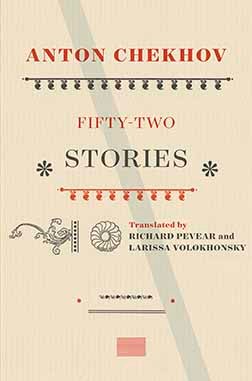‘Fifty-Two Stories’ by Anton Chekhov
WHO: Richard Pevear and Larissa Volokhonsky
WHAT: FIFTY-TWO STORIES by Anton Chekhov
WHEN: Published by Knopf April 16, 2020
WHERE: Russia!
WHY: “A welcome gathering of work by an unrivaled master of the short story form.
“The indefatigable translating team of Richard Pevear and Larissa Volokhonsky deliver a first-rate collection of Chekhov’s stories that highlight their ‘extraordinary variety.’
“In his lifetime, Anton Chekhov (1860-1904), physician and writer, was accused of immorality because he wrote of the lives of little people with little problems rather than taking the god’s-eye perspective of a Tolstoy. His reply: ‘What makes literature art is precisely its depiction of life as it really is.’ Pevear and Volokhonsky select stories — happily, one for each week of the year — that express that devotion to realism, even if sometimes broadly satirically.
“The first piece, from 1883, depicts the bursting-at-the-seams pride of a young man whose name has appeared in the newspaper, even if it’s not for reasons to be proud of: It seems that he was drunk and ‘slipped and fell under the horse of the cabby Ivan Drotov,’ then was clonked on the head by the axle. He can’t wait to tell the neighbors. Chekhov notes that he’s a ‘collegiate registrar,’ which, Pevear and Volokhonsky helpfully gloss, is at the bottom rung of the czarist civil service. In another story, ‘Fat and Skinny,’ a difference in rank takes on great importance: Old friends meet. One, it turns out, is a ‘collegiate assessor,’ a rung up the ladder, and forced to supplement his meager income by making wooden cigarette cases. ‘We manage somehow,’ he sighs, while his portly friend allows that he’s ‘already a privy councillor,’ third from the top and requiring the use of the term of address ‘Your Excellency.’
“Encounters between young and old, rich and poor, country and city people mark these stories, though perhaps the best of them is an odd, longish yarn called ‘Kashtanka,’ about a young dog, ‘half dachshund and half mutt,’ whose master, ‘drunk as a fish,’ loses her, whereupon the dog undergoes a series of adventures worthy of Pinocchio. It’s a marvel of imagination.” —KIRKUS, a starred review
. . . . .
FROM THE PREFACE:
Our intention in making this collection has been to represent the extraordinary variety of Chekhov’s stories, from earliest to latest, in terms of characters, events, social classes, settings, voicing, and formal inventiveness. By chance the selection came to fifty-two stories—a full deck! But, as Chekhov once wrote, “in art, as in life, there is nothing accidental.”
When Chekhov began to write humorous stories and sketches, he thought he was doing it simply for money. And so he was. His father’s grocery business, in their native Taganrog, on the Sea of Azov, had gone bankrupt in 1876, and to avoid debtor’s prison the family had fled to Moscow, where Chekhov’s two older brothers were already studying at the university. Chekhov, who was sixteen at the time, stayed behind to finish high school, supporting himself in various ways, one of them being the publication of humorous sketches in local papers, signed with various pseudonyms. In 1879 he graduated and moved to Moscow himself, where he entered medical school, and where his writing, still pseudonymous, became virtually the sole support of the family—mother, father, four brothers, and a sister.
Chekhov paid no attention to the artistic quality of his sketches; he simply tossed them off, sometimes several a day, and sent them to various daily or weekly humor sheets, whose editors gladly printed them. But his true artistic gift—innate, intuitive—showed itself even in the most exaggerated, absurd, and playful of these early jottings. They were mainly jokes, often satirical, but he also played with words in them, for instance in naming his characters. In “At the Post Office” (1883), the postmaster’s name is Sweetpepper and the police chief’s name is Swashbuckle. The French tutor in “In a Foreign Land” is Monsieur Shampooing, the French word for shampoo. Corporal Whompov is the heavy-handed officer in the story named for him. In “An Educated Blockhead” (1885), the name of the accused is Slopsov and the justice of the peace is Sixwingsky, suggestive of a seraph. In “Romance with a Double Bass” (1886), the main character, owner of the double bass, is named Bowsky, after the instrument’s articulator; we also run into such men as Buzzkin, Flunkeyich, and Flaskov. And there are others. These names have almost always been simply transliterated in English, giving no hint of their literal meaning in Russian.
 Media Resources:
Media Resources:
About the book, the author, and the translators | Download the jacket | Download a photo of the translators
Knopf. 528 pages. $35 ISBN 978-0-525-52081-8
To interview the translators, contact:
Kathy Zuckerman | 212-572-2105 | kzuckerman@penguinrandomhouse.com